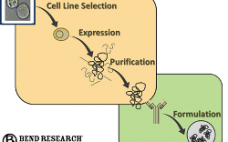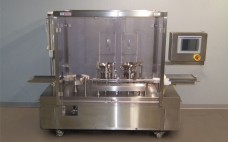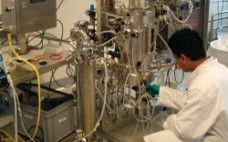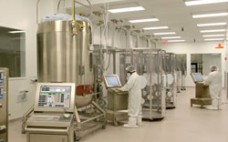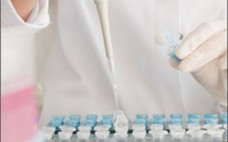In the spirit of implementing PAT (Process Analytical Technology), biopharmaceutical companies are striving to gain a more fundamental understanding of what is happening to the cells within their bioreactors. Implementation of online tools like Raman and Dielectric Spectroscopy are helping to provide insight, yet there is still a gap integrating this data with off-line measurements such as cell density, viability, metabolite levels and titer. Bend Research, in collaboration with major biopharmaceutical companies, is working to advance MAST, a modular, automated sampling platform that can provide samples directly from bioreactors to analytical devices, while maintaining process sterility. In this webcast, Clint Pepper, Ph.D. and Lisa Graham Ph.D., P.E. of Bend Research focus on this overall cell-level “observability” concept and illustrate how the MAST platform is incorporated.
Manufacturing
Small Scale Automated Vial Filling
For small scale vial filling operations the FLT features an ideal platform. With the ability to automatically fill, stopper, and cap most common vials with minimal size parts and a user friendly control system the FLT has the features big machine features in a compact package. The mobile cart and standard utility requirements the FLT can be utilized by several different users in a lab situation. The FLT can be used with a peristaltic pump, or a rolling diaphragm dosing system, both of which are available as a single use option from the Bosch PreVAS dosing system family. Utilizing an automated system reduces filling error and product loss in comparison to manual filling operations, reduced operator fatigue and improved productivity without adding headcount.
Intensified Manufacturing: Economic Models Comparing Steel, Single-Use and Concentrated Process Options
Refine Technology, LLC, in conjunction with Biopharm Services, developed two economic models to examine the cost of goods and capital requirements of cell culture production facilities configured based on different production scenarios, including variables such as:
• Amount of product required
• Vessel sizes
• Number and type of vessels (stainless steel vs. single use)
• Product titer
• Seed train
• Upstream and downstream requirements
In this educational webcast, John Bonham-Carter, Vice President of Sales and Business Development at Refine Technology, analyzes the effect of these variables in relation to operating mode, continuous culture (perfusion) versus traditional fed batch. Join John as he presents results and discussion for facilities producing 50 and 500Kg of protein per year.
Blank Slate Biomanufacturing: Designing the Ideal Operation from a Blank Sheet of Paper
If you could start with a blank sheet of paper, what would your biomanufacturing operation look like? Robust, adaptable, cost-effective and efficient probably come to mind, but how do you get there? In this educational webcast, Parrish Galliher, Founder and CTO of Xcellerex, takes an in-depth look at the strategies involved in designing the ideal biomanufacturing facility from a blank slate. You’ll learn how to optimize your operation to:
• Increase Speed
• Enhance Flexibility
• Decrease Risk
• Improve Economics
View this webcast to discover the steps for maximizing your biomanufacturing process.
Key Aspects of Managing Early Phase Development Programs for Long Term Success
From selection of a cell line to release of the first clinical batch, product and process developers make decisions that have timeline, financial, and regulatory consequences. As contract manufacturing becomes the norm rather than the exception in our industry, it is important that a Sponsor and CMO make the best use of each other’s expertise for maximum benefit to product and patients. In this presentation, Dr. George Koch, Chief Scientific Officer for Contract Manufacturing and Director of Project Management with Fujifilm Diosynth Biotechnologies, provides insight into:
• Selecting a CMO
• Process and Method Development
• The First Tox Lots
• The First Clinical Lots
View this on-demand educational webcast to learn more about manufacturing best practices for preclinical activities.
Fill, Finish and Testing of Phase I/II Drug Products
Florida Biologix, a full service CMO for Phase I/II biologics, has significant experience with a variety of aseptic liquid fill projects. This presentation walks you through key considerations and decisions you will need to make when outsourcing a fill. This webcast discusses the major considerations involved in the process, such as:
• Timeline
• Component, Volume & Testing
• Documentation
• Execution
• Shipping, Handling and Storage
The presentation provides information that anyone looking to outsource a clinical batch liquid fill needs to know to help ensure a successful outcome.
Global Material Harmonization for Increased Effectiveness and Reduced Risk
As geographic distances continue to metaphorically shrink, there is an increased focus on improving operational effectiveness. But, in order to increase effectiveness, it is important to understand and mitigate risk. In this on-demand webcast, Ben Locwin of Lonza Biologics demonstrates how material harmonization can help reduce risk and increase effectiveness by allowing:
• Use of one material specification
• Shared testing
• Shared raw material qualifications
• And more.
View this webcast to learn more about how synchronization of raw material testing can not only improve effectiveness, but reduce risk and lower costs as well.

